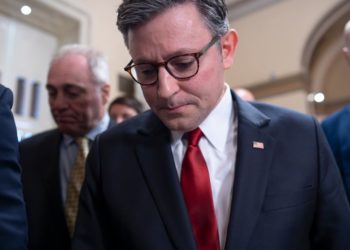Late last month, Japan’s chief U.S. trade negotiator, Ryosei Akazawa, chatted with officials gathered at an embassy event in Tokyo. Japan’s top power company had pledged to buy up to 5.5 million tons of U.S. natural gas each year for two decades. That was a good start, Mr. Akazawa said, but could it perhaps double it?
The remarks from Mr. Akazawa, relayed by two people who spoke on the condition of anonymity to discuss the private event, highlighted the bind Japan has landed in days before July 9, when Mr. Trump has indicated his pause on so-called reciprocal tariffs would expire.
In monthslong negotiations with their counterparts in the United States, the biggest buyer of Japan’s exports, Japanese officials have extended a number of offers they expected to be well received. They pledged to purchase more American energy products and defense equipment, and to help the United States in areas like shipbuilding.
Yet none of those overtures convinced Mr. Trump to back down on across-the-board reciprocal tariffs — initially set at 24 percent on Japan — or to remove a separate 25 percent tariff on cars that has hammered Japanese automakers.
In recent days, Mr. Trump has emphasized his grievances with Japan over two core issues. He believes it is unfair that Americans buy Japanese-made cars in abundance while American cars in Japan are few and far between, and that Japan imports relatively small amounts of American rice. On Tuesday, he said he doubted a trade deal was attainable before next week’s deadline.
So far, the Trump administration has reached preliminary agreements on tariff reductions with only two countries, Britain and China, highlighting the difficulties major U.S. trade partners have encountered in negotiations. Still, some trade experts suggested Japanese negotiators may have miscalculated by offering concessions peripheral to the issues that have for decades frustrated Mr. Trump. Mr. Akazawa’s office did not immediately respond to requests for comment.
The U.S. administration “welcomes talking about issues like economic security, natural gas purchases and defense articles,” said William Chou, the deputy director of the Japan policy center at the Hudson Institute, a think tank. But for Mr. Trump, he said, “it’s about what he sees as unfair access and Japan unfairly shutting the U.S. out.”
Mr. Trump and his trade officials have taken aim at economic barriers in Japan that they argue impede the sale of American automobiles and agricultural products.
Japan protects domestic production of rice, its staple grain, with a tariff of about $2.38 per kilogram on imports beyond a tax-free quota of roughly 770,000 tons. Last year, nearly half of Japan’s tariff-free rice imports came from the United States, and Japan has increased purchases from overseas in recent months.
Those imports apparently weren’t enough for Mr. Trump, whose administration has called Japanese rice policies “egregious.” In a social media post on Monday, Mr. Trump wrote that Japan’s reluctance to import more American-grown rice indicated it was “spoiled” regarding trade with the United States.
Mr. Trump has also long voiced frustration that only a few thousand American vehicles sell in Japan each year. In contrast, Japanese automakers exported 1.3 million vehicles to the United States in 2024. But Japanese car companies also produced millions more at two dozen American manufacturing facilities that collectively employ more than 100,000 workers.
Mr. Trump and U.S. trade officials attribute minimal American car sales in Japan to unfair disadvantages like safety standards that are different than those in the United States. Others in the industry argue that Japanese consumers prefer smaller, domestically produced vehicles.
In Japan, the government could have early on offered the Trump administration conciliatory measures, like buying more tariff-free American rice to help fill domestic shortages and allowing cars that pass American standards to drive on Japanese roads, said Masahiko Hosokawa, a former senior official at Japan’s trade ministry.
“Trump has, from the start, made it clear that rice and automobiles are the areas he’s focused on,” Mr. Hosokawa said. “Japan has been too slow in properly conveying that it would work on these specific issues,” he added.
Now, Japanese officials are facing domestic pressures, including a national election on July 20, that dim the prospects of making concessions on rice imports or accepting a trade deal that includes the current auto tariffs.
This means the world’s fourth-largest economy, for now, remains among dozens of countries confronting the specter of steep tariffs from its top trading partner with little immediate hope of an agreement.
Japan’s prime minister, Shigeru Ishiba, has said he is opposed to signing any deal with the United States that does not roll back car tariffs. Asked on Tuesday about Mr. Trump’s comments on rice imports, Japan’s chief cabinet secretary said the country would not consider moves that would “sacrifice” its agriculture industry.
Given these sticking points, Tobias Harris, the founder of the advisory firm Japan Foresight, said the two sides would be unlikely to reach a deal by July 9. The question, he said, is “whether the two governments can reach some agreement that extends the suspension of reciprocal tariffs as negotiations continue.”
Kiuko Notoya contributed reporting.
River Akira Davis covers Japan for The Times, including its economy and businesses, and is based in Tokyo.
The post How U.S.-Japan Tariff Talks Got Stuck on Cars and Rice appeared first on New York Times.




